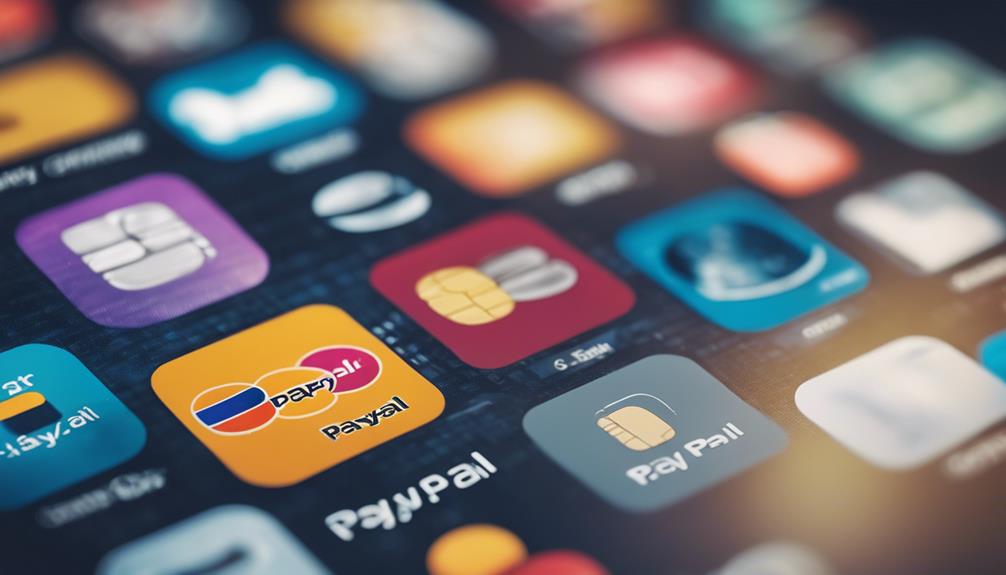When choosing among top payment gateway providers, compare transaction fees, global reach, support quality, fraud protection, integration ease, and user experience. Transaction fees vary, so consider setup costs and pricing transparency. PayPal covers 25 currencies globally. Stripe supports 135+ currencies in 46 countries. Square processes in 7 currencies across 8 countries. Authorize.net allows transactions in 10+ currencies. Evaluate recurring billing support and fee structures wisely. Each provider offers unique advantages to cater to diverse business needs. Understanding these key factors will guide your decision-making process effectively towards the ideal payment gateway solution.
Key Takeaways
- Evaluate transaction fees and fee structures for cost efficiency.
- Consider global reach and currency support for international transactions.
- Assess recurring billing support and tools for subscription management.
- Analyze on-form payment options and customization capabilities.
- Review additional features, integrations, and setup costs for a comprehensive comparison.
Key Factors for Provider Evaluation

When evaluating payment gateway providers, consider key factors such as:
- Transaction fees: Vary among providers, with options like PayPal charging 2.9% + $0.30 for US transactions and a higher rate for international payments.
- Setup costs: Evaluate setup fees and monthly costs, such as Helcim's interchange plus 0.5% and 25 cents per online transaction with no additional charges.
- Pricing transparency: Look for transparent pricing structures like Square's 2.9% + $0.30 or 3.5% + $0.15 transaction fees without hidden costs.
- Customization options: Assess customization options and developer support, such as Stripe's free and flexible API tailored for businesses of different sizes.
- Additional features and integrations: Explore the availability of extra features and integrations, including Braintree's support for non-hosted custom checkout and PayPal Express Checkout functionality.
Transaction Fee Analysis
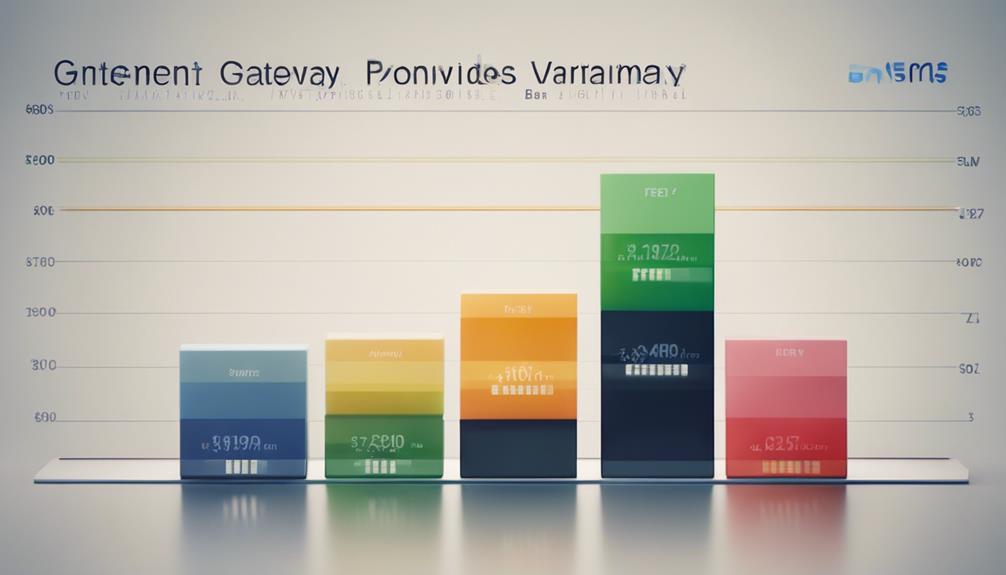
When analyzing transaction fees among payment gateway providers, it's important to compare fee structures and uncover any hidden charges that may impact your business.
Understanding the complete cost breakdown can help you make informed decisions and choose the right payment gateway for your needs.
Fee Structures Compared
Comparing the transaction fee structures of various payment gateway providers reveals distinct pricing models and cost variations. PayPal charges 2.9% + $0.30 for US transactions and 3.9% for international payments. Stripe maintains a similar fee of 2.9% + $0.30, with no monthly fee.
Square offers 2.9% + $0.30 or 3.5% + $0.15, suitable for online and offline retailers. Authorize.net includes setup fees plus 2.9% + $0.30 per transaction, with additional costs.
2Checkout (now Verifone) charges 3.5% + $0.35 and supports over 100 currencies. These fees are essential for online payments, credit card transactions, and maintaining secure transaction processing through payment gateways.
Merchant accounts and digital wallets also rely on these fee structures to process payments efficiently while ensuring security measures.
Hidden Charges Analysis
Expose the actual cost of using payment gateway providers by delving into the world of hidden charges within their transaction fee structures. When analyzing transaction fees, it's imperative to take into account the fees per transaction for both domestic and international payments.
PayPal, for instance, charges 2.9% + $0.30 for US transactions and 3.9% for international payments.
Stripe applies a standard fee of 2.9% + $0.30 per successful card transaction, excluding monthly fees.
Square's transaction fees vary from 2.9% + $0.30 to 3.5% + $0.15 based on the transaction type.
Authorize.net imposes a 2.9% + $0.30 transaction fee alongside additional charges like setup costs.
Meanwhile, 2Checkout (now Verifone) starts at 3.5% + $0.35 per transaction, accommodating international payments in numerous currencies across various countries.
Card Acceptance Overview
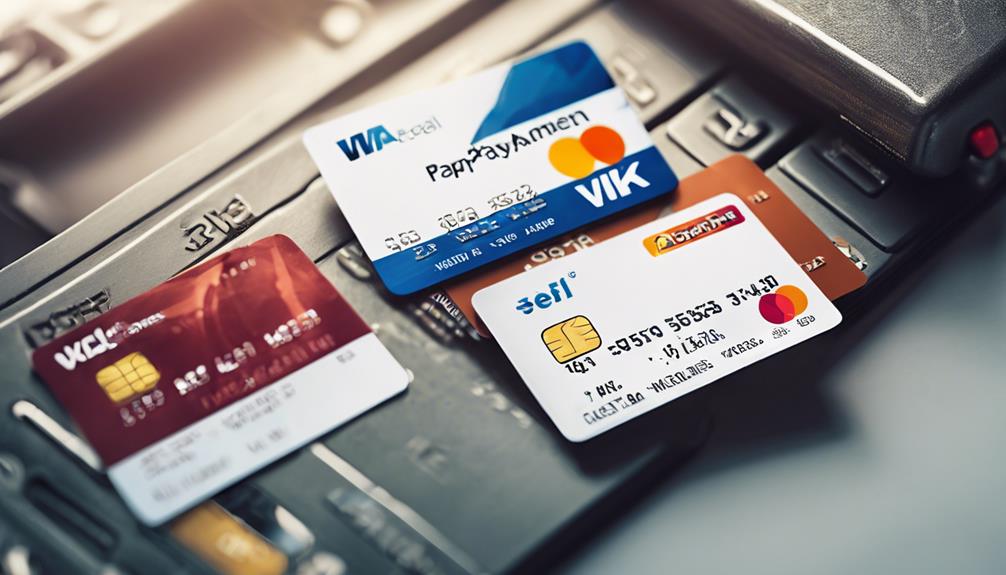
Exploring the card acceptance overview, you'll find a range of options offered by top payment gateway providers like PayPal, Stripe, Square, Authorize.net, and 2Checkout (Verifone).
- PayPal accepts payments in 25 currencies across 200+ countries, making it a versatile choice for international payments.
- Stripe supports transactions in 135+ currencies in 46 countries, providing a wide reach for online stores.
- Square processes payments in 7 currencies across 8 countries, ideal for small businesses looking for a simple and secure payment solution.
- Authorize.net allows transactions in 10+ currencies in over 30 countries, offering reliable fraud protection for credit and debit payments.
These payment gateway providers cater to a variety of needs, from digital payments to secure transactions. Whether you run a small online store or manage an international business, these options for card acceptance guarantee a seamless payment experience for your customers.
On-Form Payment Process Comparison
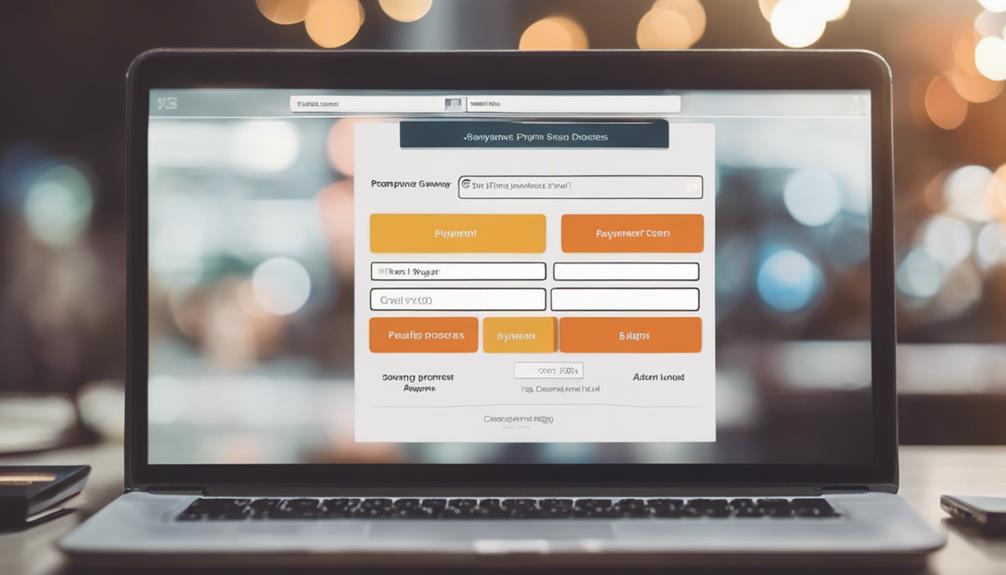
When evaluating the on-form payment processes of various providers, you'll notice distinct transaction fees and customization options tailored to different business needs.
PayPal offers on-form payment options with a transaction fee of 2.9% + $0.30 for US transactions and 3.9% + standard fee for international payments.
Stripe provides customization tools for on-form payments and charges a transaction fee of 2.9% + $0.30, supporting 135+ currencies in 46 countries.
Square supports on-form payments in 7 currencies across 8 countries, with transaction fees ranging from 2.9% + $0.30 to 3.5% + $0.15 depending on the transaction.
Helcim offers on-form payment processing with interchange plus 0.5% and 25 cents per online transaction, catering to high-volume retailers with no monthly or statement fees.
WePay specializes in on-form payment processing for SaaS companies and startups in the US, charging a transaction fee of 2.9% + $0.30 and supporting 3 currencies.
Each provider caters to specific needs, offering varying transaction fees and features for online form payments.
Recurring Billing Support Assessment
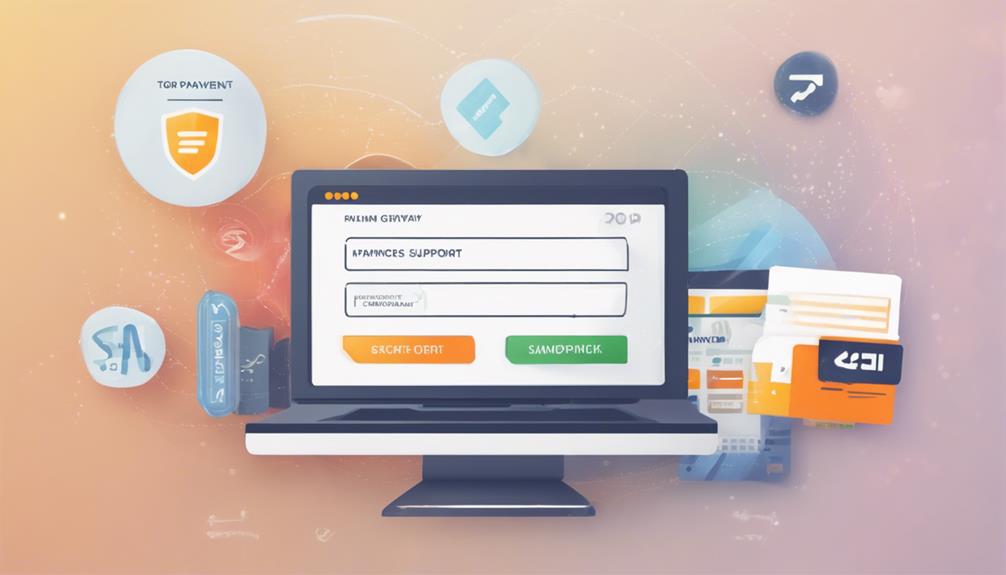
Moving forward from the comparison of on-form payment processes, the evaluation now centers on examining the support for recurring billing across various payment gateway providers. When considering the top payment gateway providers, here's how they fare regarding recurring billing support:
- PayPal: Supports recurring billing for subscription services, ensuring a seamless payment experience for customers.
- Stripe: Provides robust tools to manage recurring payments, allowing businesses to maintain efficient billing cycles.
- Authorize.net: Offers recurring billing support to automate subscription payments and streamline billing processes effectively.
- Square: Enables businesses to set up recurring billing for subscription-based services, enhancing customer convenience by simplifying the billing process.
Understanding Fee Structures

When considering payment gateway providers, it's important to understand fee structures. This involves focusing on pricing models and transaction fees. Different providers offer varied fee setups, such as flat transaction fees or tiered systems, which can impact your business's bottom line.
Evaluating these structures can help you choose the best payment gateway solution that aligns with your budget and sales volume.
Pricing Models
Understanding the fee structures of payment gateway providers is essential for making informed decisions on which service to use for your business. When evaluating pricing models, consider the following key points:
- Low-Cost Payment Gateway: Look for providers with competitive rates to save on transaction fees.
- Interchange Plus: Opt for interchange plus models for transparent pricing.
- Developer-Oriented Customization: Choose gateways like Stripe that offer customization tools for developers.
- Reliability and Security: Prioritize providers like Authorize.net known for their reliability and security features since 1996.
Carefully examining these factors will help you select a payment gateway that aligns with your business needs while keeping costs in check.
Transaction Fees
To understand the fee structures of payment gateway providers, analyze the transaction fees they charge for each transaction. When comparing top providers, you'll find varying transaction fees that can impact your business's bottom line.
PayPal, for instance, charges 2.9% + $0.30 for US transactions and 3.9% + standard fee for international payments. Stripe offers a transparent choice with a standard transaction fee of 2.9% + $0.30, while Authorize.net includes setup fees alongside a 2.9% + $0.30 transaction fee.
On the other hand, 2Checkout (now Verifone) is competitive for global businesses with a transaction fee of 3.5% + $0.35 per transaction. Understanding these transaction fees is essential for making an informed decision for your business.
Frequently Asked Questions
How Do I Compare Payment Gateways?
To compare payment gateways effectively, start by examining:
- Transaction fees
- Supported currencies
- Security features
- Integration options
- Customer support
Evaluate:
- Percentage fees and additional costs per transaction
- Currency options for international transactions
- Security measures like encryption
- API capabilities for integration
- The level of customer support provided
This thorough analysis will help you select the best payment gateway for your needs.
What Is the Most Popular Payment Gateway?
The most popular payment gateway, based on global reach and currency support, is PayPal. Operating in 204 countries and backing 25 currencies, PayPal leads the pack.
Stripe and Square, though widely used, fall short of PayPal's extensive coverage.
When it comes to sheer popularity and widespread acceptance, PayPal remains the top choice for businesses looking to expand their payment options globally.
What Is the Largest Payment Provider in the World?
PayPal is the largest payment provider globally, operating in 204 countries and supporting 25 currencies. With over 435 million active accounts, PayPal processes transactions worth over $22 billion yearly.
Offering services like PayPal Standard, PayPal Pro, and PayPal Checkout, it caters to diverse business needs. Transaction fees are competitive, starting at 2.9% + $0.30 for US transactions.
PayPal's widespread reach and user-friendly interface make it a top choice for businesses of all sizes worldwide.
What Is the Difference Between Payment Aggregator and Payment Gateway?
Payment aggregators like PayPal and Square combine multiple merchants under one account for streamlined payment processing. On the other hand, payment gateways such as Authorize.net and Stripe focus on securely transmitting transaction data for online purchases.
Aggregators simplify onboarding by eliminating the need for separate merchant accounts, while gateways guarantee secure data transfer between websites and payment processors.
Understanding this distinction is vital for businesses to choose the right payment processing solution.
Conclusion
In summary, after conducting a comparative analysis of the top payment gateway providers, it's evident that each provider offers unique advantages and features. When considering which payment gateway provider to choose, it’s important to evaluate your specific business needs and goals. Some providers may offer lower transaction fees, while others may prioritize advanced security features. Additionally, integrating payment gateways seamlessly with your existing systems and platforms can be a crucial factor in making the best choice for your business. Therefore, it’s essential to carefully assess the pros and cons of each provider before making a decision.
The key factors for evaluation, transaction fee analysis, card acceptance overview, on-form payment process comparison, and recurring billing support assessment all play significant roles in determining the best fit for your business needs.
Understanding fee structures is essential for making an informed decision. Choose wisely to optimize your payment processing efficiency and customer satisfaction.

